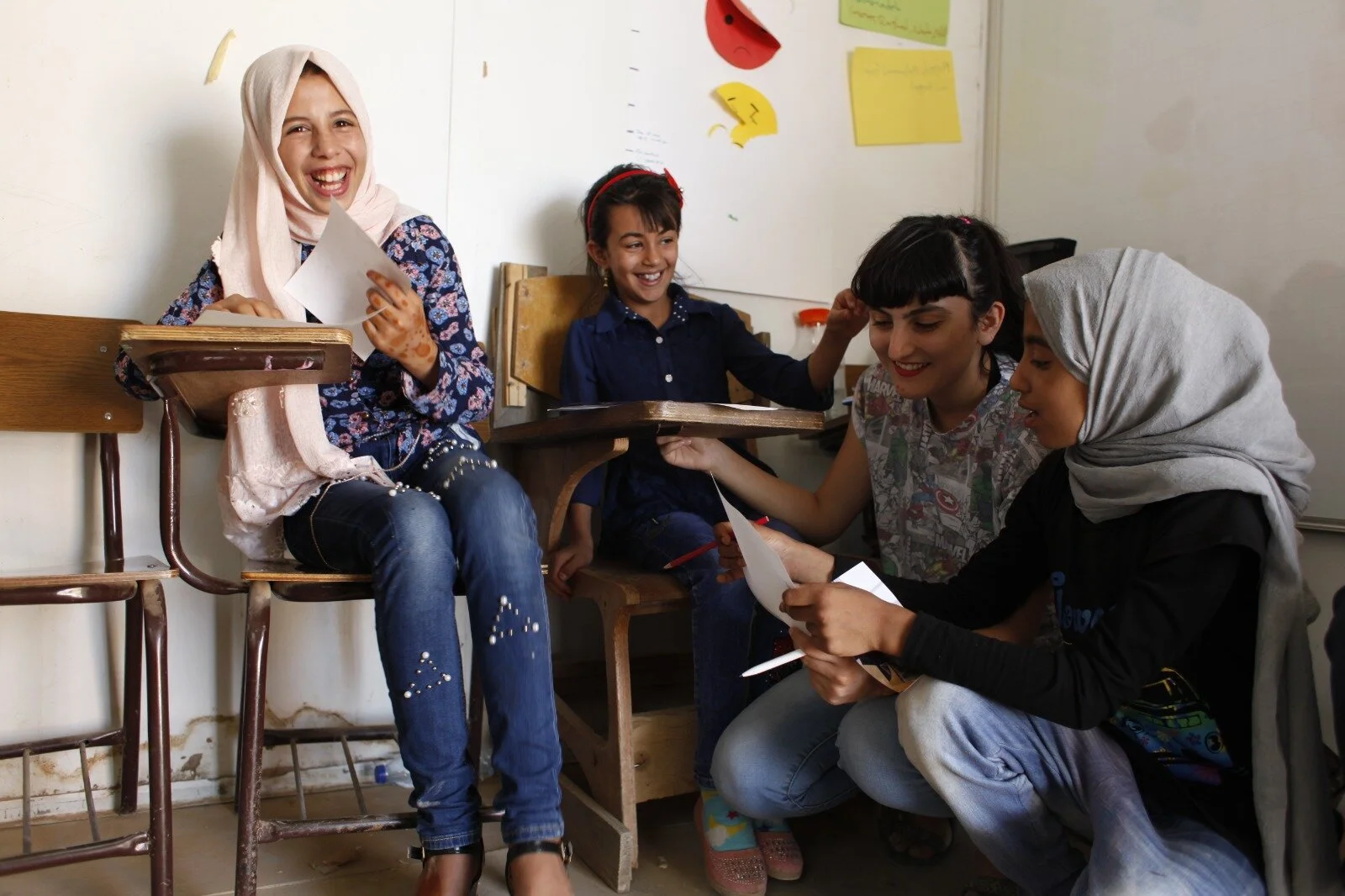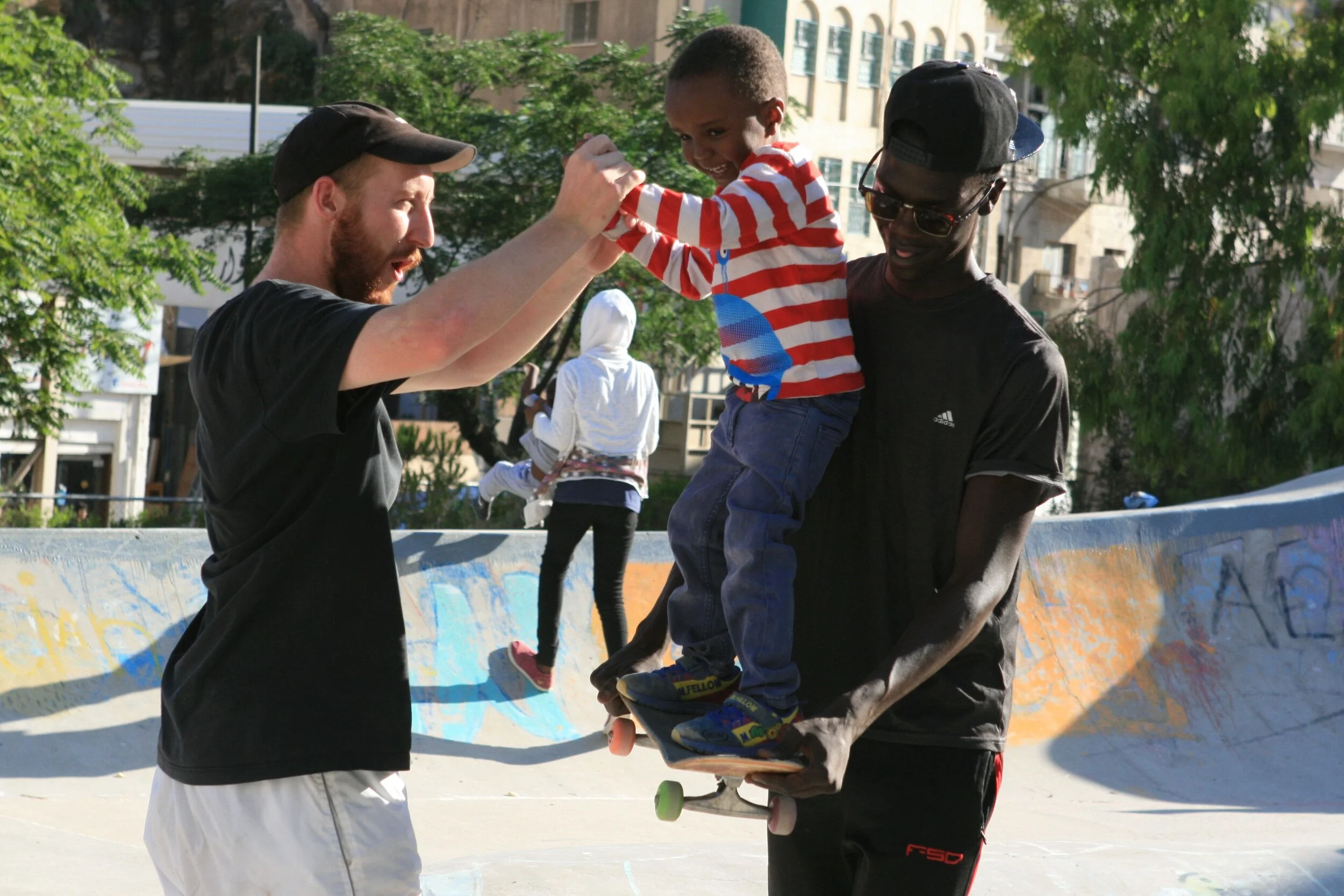Articles
From 2023, we have rebranded our name to Mawja Radio. Whilst still focused on supporting the lives of young people in Zaatari, as the organisation develops and now regularly operates outside of The Village, our new name reflects the work we are conducting in Jordan and beyond. Accordingly, Mawja (Arabic for wave) was chosen to represent the organisation’s core principles of re-wiring sonic ecologies and sound media narratives that transmit throughout all our projects whilst staying true to the roots of our work in Zaatari. We would like to thank Ayla Mortada for the support during this process and rebranding of our work, and look forward to sharing a host of new activities under our new name Mawja Radio in 2023.
An Interview with Forever Playground
“Children are completely under looked within development studies and humanitarian work. Because they are considered young and inexperienced, they are treated like passive actors who are disempowered needing organisations to work on their behalf. In truth, children see the world and imagine solutions to problems that adults can never do. They are imaginative, pragmatic and not scared of falling down. ”
Ahead of the new year, we took time to sit down with Lisa Jacob from the NGO Forever Playground to talk about Zaatari Radio past, present and future.
An Interview with Kas Wauters – Skate Boss/7Hills Programme Manager
“And in a way, things have flipped now with how 7Hills runs. Now the kids run 7Hills and it’s their skatepark and skate programme, and international volunteers affirm to the kids that they are building something really cool inside of Jordan, it’s so fucking cool these international volunteers are coming there because of them.”
This interview appears as a prelude to a forthcoming publication serving as a documentation of our experiences and entanglements within the Middle East up to Summer 2020 and the Covid-19 Pandemic. I sat down with Kas (via zoom!) over the course of an hour for a talk about how 7Hills Skatepark in Amman has developed from near desolation to a wealth of activity in the City. Kas shares an intimate tale of this journey and how things are looking in the future for the organisation.
Ibi Ibrahim: Creativity in Conflict
Aisha Kherallah & Tom Critchley
“Through local and international exhibitions featuring the work of Yemeni artists, trainings, residencies, workshops, literature events, conferences, film festivals, artists talks, and public programming, the foundation aims to contribute to the development of a pluralistic, democratic society in Yemen”
Our latest article is a feature piece on multi-talented, Yemeni artist Ibi Ibrahim. From working with creatives from Yemen on an upcoming book, to short films and musical output, Ibi has been advocating the arts for reconciliation throughout the Civil War in Yemen.
Pushing Boundaries of Humanitarian Work: Angola’s First Skatepark
Tom Critchley
“Each member of this volunteer team were able to call on their past experiences and expertise to ensure that the skatepark was finished to the highest quality, however the commitment of over 50 local volunteers to construction throughout the 30 days not only ensured we were on schedule, but the cross-culture exchange of attitudes and ideas created a unique project strengthened by continued community engagement.”
The latest blog series with UNHCR Innovation details our time in Angola building the country’s first skatepark and ‘Edu-Skate Program’, exploring how grassroots NGOs such as Concrete Jungle Foundation are leading the way in contemporary innovative humanitarian responses.
Audio-Based Communication: Radio, Listening Groups, and Beyond
Tom Critchley
“So whilst radio was highlighted as a trusted channel for communication that engaged with refugee communities, it was not currently being used as a source for trusted information. Therefore in radio, we have a powerful and dependable source of information, yet a distinct lack in sources of information curated for Zaatari. In establishing Zaatari Radio, we aimed to fill this information void, broadcasting refugee-relevant information as well as offering an entertainment service for those listening to the station, as well as for those who are hosting radio programs.”
Our third article on UNHCR Innovation explores all things audio, deconstructing methods of Communicating with Communities through radio, listening groups and beyond.
Innovative Fundraising: How to build a community around your grassroots project
Tom Critchley
"Much like your project itself, the means to funding should be imaginative and innovative to not only ensure you raise enough funds but also catch the attention of those supporting your project to build your following even more"
Our second blog post for UNHCR investigates how to fund your humanitarian project, offering guidance on hosting fundraisers and managing Crowdfunding platforms such as Kickstarter.
The take away point is: funding is not a barrier to innovation but an opportunity to inspire a community of followers to tackle humanitarian issues together. It’s basically a big thank you to everyone who has supported us so far, without your support we would not be able to make Zaatari Radio happen.
Grassroots Humanitarian Projects: How to Get Started
Tom Critchley
"Funding is not a barrier to innovation, but an opportunity to build a community"
We have been invited by UNHCR Innovation to conduct a blog series about establishing grassroots humanitarian projects. If you’re looking to get your own project up and running, our first article shares Zaatari Radio’s experiences in building from the ground up.
Throughout the series we’ll be writing about successful fundraising, building the community of supporters around the project, and our expectations versus realities of running the project on the ground.
Mapping the Rise of London’s Online Broadcasting to Refugee Radio
Tom Critchley
"Perhaps not the first similarity one would think of, but a closer examination reveals a number of trends between the two. This article assesses the similarities between online broadcasting in London and refugee radio, and asks if the latter can follow the example of online radio, and become a more prominent fixture worldwide."
Tom Critchley investigates similar trends between London's Online Radio stations and refugee broadcasting, asking if more could be done to support refugee radio.
The Medium is Not the Message
Ross Field
"What is not provided in VR, that is provided in mediums such as literature, is a depth of emotional engagement and an openness to interpretation. Without which this could lead to VR being called a technologically advanced form of voyeurism, and even more severely as a form of disaster tourism"
Ross Field takes a critical look at the role of VR in creating empathy for refugees











